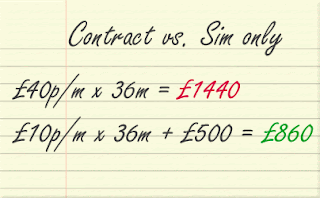With an ever growing range of electrical appliances and gadgets, we are using more electricity than ever before. If you're not careful, you're likely to get a nasty shock at the end of the month when the bill arrives.
In another article we'll look at how to price-compare for electricity providers, but this article looks at small life changes that can help to lower your electric bill.
There is a notable difference between electricity use and electricity waste. These tips will concentrate on the latter so that you can cut the costs without changing your lifestyle. You can leave the candles in the cupboard for now!
If you need to recap anything you've read, or would like a quick summary of tips, you can scroll down to the Recap section at the bottom of this article.
Shut it off!
This one should go without saying. Entertainment devices like TVs, DVD players and games consoles can eat through power. For some of us, watching less TV is an unthinkable sacrifice, but it helps to turn these devices off when they're not in use.
Vampire power
Take down the wreathes of garlic, they aren't going to help! 'Vampire power' is when devices and appliances leach power from the mains supply while they are on standby. Some devices can use up to 90% of the power they use when they're switched on! This is increasingly common for modern devices such as TVs, DVD players and games consoles.
You can usually tell when a device is on standby because lights or displays (usually in red) will remain illuminated. The advantages to standby mode are that it can allow a device to start-up more quickly, or can be activated by a remote control. The disadvantages are that the device is costing you money even when it's not in use, and it can also pose a fire risk.
If you wish to save energy by eliminating vampire power, you can either unplug the device or check the user guide for instructions on how to switch it off completely.
Lights out, all out
One of the most obvious ways of cutting down your electricity bills is to switch of electric lights when you're not in the room. While it may sound like common sense, the vast majority of people will think nothing of leaving a light on for hours at a time. A little mindfulness in this area can go a long way.
There are also ways of saving money while the light is in use by using lower watt or energy-saving bulbs where appropriate. For further information on energy saving light bulbs, click here.
By following these two steps, you can reduce your electricity bill without affecting how you use electricity in your home.
Staying out of hot water
It can be incredibly expensive to heat water with electricity. Whether it's the boiler, shower, a washing machine, dishwasher, or even just an electric kettle, this is likely to form about 1/3 of your electricity bill: for this reason, it's important to consider what you can do to cut costs in this area.
If you have an electric powered boiler, consider setting it to boil only once or twice a day and remain on for a limited time. If you time things right, this should be enough to provide you with hot water when you need it most such as for washing dishes or taking baths.
When you're in the shower, water isn't the only thing going down the drain. Although it can be tempting to lounge under the running water, you should try to keep showers to around five minutes and, if appropriate to your lifestyle, take one only every other day.
Running a washing-machine can be expensive too, so it's worth putting a little thought into how you can run the fewest possible cycles, and what the lowest reasonable temperature is to run them at (30 degrees should be more than adequate for most washes). Depending on your lifestyle, you could try wearing things more than once to delay their return to the laundry basket. Alternatively, you could delay your wash until you have enough lights or darks to justify running a cycle. If you typically use a drier after a wash-cycle, consider hanging the clothes up to dry instead.
If you're heavily reliant on a dishwasher, consider saving all the day's washing for just one cycle on the evening. After all, running just one cycle on your dishwasher costs around 15p. This might not sound much, but if you run two cycles a day you'd be looking at a bill of £109 per year for the dishwasher alone! If you only have a few bits and pieces to wash, there is always the sink.
When you're using an electric kettle, you should only boil the amount of water you need. Not only will this help you save electricity, but the kettle will boil faster. After all, why spend extra on boiling water that's only going to go cold again in the kettle?
Keeping cool
Fridges and freezers work most efficiently when they are full (but not so full as to completely block the air circulation). If you have empty space in your fridge or freezer, consider filling them with balls of newspaper or other such items.
Allow hot foods to cool before placing them in the fridge. If you put hot food in the fridge then it will be forced to work at full power to keep the temperature stable.
Defrost things in the fridge. Not only will the food be defrosted safely, but it will help keep your fridge cold so that it doesn't have to work as hard.
Any liquids you have in the fridge should be covered as liquid vapors can add to the compressor's workload.
Vacuum your freezer's condenser coils (behind or beneath the unit) about every three months. Dust build-up in this area can lead to a 25% drop in efficiency.
Staying warm
If your home uses an electric heating system or an electric fire, keeping use to a minimum is essential if you're going to keep your bills down. A reduction of just a few degrees on your thermostat can equate to savings of 5% and upwards!
If you're still cold, consider wearing an extra layer of clothing or sitting with a blanket (though not an electric one!).
Buy what's efficient
If you're considering replacing any of your appliances, be mindful of energy efficiency. Such energy efficient items may cost more in beginning, but the overall savings will reimburse you for the extra outlay several times over.
Misc
Last but certainly not least are the miscellaneous tips that didn't really seem to fit anywhere else.
- Be quick when you're opening the oven door, or the door of the fridge or freezer. The longer the doors are open, the greater the change in temperature, and the harder the appliance will have to work to get things back to how they were.
- Use LCD as opposed to CRT monitors. LCD monitors are almost twice as efficient.
- Use a laptop instead of a desktop computer. Laptops use significantly less power.
Recap
If you're serious about saving on your electricity bill:
- Switch off any electrical items when they're not in use.
- Don't allow your items to lounge in standby mode.
- Switch off lights when you're not in the room.
- Replace inefficient or high-wattage light bulbs with lower watt and energy efficient alternatives.
- Set your boiler to come on only at key times of the day and to remain on for a minimal period.
- Take fewer showers and don't dawdle!
- Run fewer and cooler cycles on your washing machine.
- Hang up your clothes to dry instead of using a tumble drier.
- Run fewer dishwasher cycles.
- When using a kettle, only boil the water you need.
- Fill empty space in fridges and freezers with balls of newspaper.
- Let food cool before placing it in the fridge.
- Defrost frozen food-stuffs in the fridge.
- Keep refrigerated liquids covered.
- Vacuum your freezer's condenser coils.
- Turn the thermostat down.
- If you're cold, wear a sweater!
- Buy energy-efficient appliances where you can.
- Don't keep oven and freezer doors open for too long.
- Use LCD monitors instead of CRTs.
- Use a laptop instead of a desktop computer where possible.













